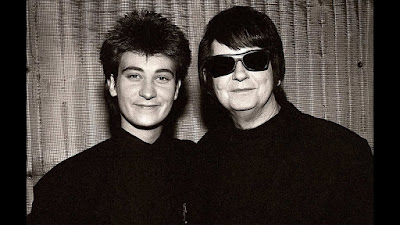Always Be "Crying"
I saw k.d. lang perform live a number of times back in the early 1990s, and one thing never failed: When she sang "Crying," we would be standing. Even if we knew what was coming—those long, clear high notes crashing like waves against the stately march of the song's mounting chords—it got us to our feet every time, whether it was early in the show or a climactic encore. Lang, one of the great song interpreters of our or any time, has connected with a lot of stellar material over a long and sadly under-appreciated career, some of it her own making, but there is something about this Roy Orbison oldie from 1961 that was a perfect match for her outsized talent, like a blowtorch getting a blast of fuel. (I am an outlier in that I loved her first three country albums to distraction and was heartily disappointed by Ingenue, though plenty of it later grew on me and I did quite like Drag and some subsequent records; last time I saw her live, with case lang viers, I was nearly as happy as everyone else to hear "Constant Craving" again.)
I've never been as big a Roy Orbison fan, though I cherish most of his hits and admire his first-rate comeback/farewell record, Mystery Girl (and not just for this great Elvis Costello cover). He's obviously one of the greats but I just don't spin him very often. Then recently I happened to hear his original "Crying" single again, and it hit me what has always put k.d.'s version over the top. The song has an inexorable build to it, typified most obviously by the octave jump from its first "crying" chorus to its second. But whereas he (and Don McLean in his hit cover version) sings that second "crying" chorus in a girlish falsetto that sounds a bit like a half-hearted Frankie Valli impersonation—as if lightly mocking, or holding a bit at arm's length, the too-real sound of a man helplessly bawling over lost love—lang hits those high D notes with full chest voice, and the impact is shattering. First, here's Orbison doing it live in '65:
You have to give the man credit for creating the song's dramatic rock-bolero rise and fall (a skill he had in spades), and for the brilliant central notion of stretching "crying" over that indelible five-note pattern. You have to give the man even more credit for sharing his duet version of the song with lang so graciously, handing her those big notes, and in a sense handing the song over to its rightful owner. Listen to the stunned gratification of the audience in these, the best two captures of her vintage performances of the song. (The first is even more impressive in that she overcomes an egregiously twee orchestration):
In this next one, as in the first, listen for the slight raspy snarl she adds to the "O" of the final "over you."
I've never been as big a Roy Orbison fan, though I cherish most of his hits and admire his first-rate comeback/farewell record, Mystery Girl (and not just for this great Elvis Costello cover). He's obviously one of the greats but I just don't spin him very often. Then recently I happened to hear his original "Crying" single again, and it hit me what has always put k.d.'s version over the top. The song has an inexorable build to it, typified most obviously by the octave jump from its first "crying" chorus to its second. But whereas he (and Don McLean in his hit cover version) sings that second "crying" chorus in a girlish falsetto that sounds a bit like a half-hearted Frankie Valli impersonation—as if lightly mocking, or holding a bit at arm's length, the too-real sound of a man helplessly bawling over lost love—lang hits those high D notes with full chest voice, and the impact is shattering. First, here's Orbison doing it live in '65:
You have to give the man credit for creating the song's dramatic rock-bolero rise and fall (a skill he had in spades), and for the brilliant central notion of stretching "crying" over that indelible five-note pattern. You have to give the man even more credit for sharing his duet version of the song with lang so graciously, handing her those big notes, and in a sense handing the song over to its rightful owner. Listen to the stunned gratification of the audience in these, the best two captures of her vintage performances of the song. (The first is even more impressive in that she overcomes an egregiously twee orchestration):
In this next one, as in the first, listen for the slight raspy snarl she adds to the "O" of the final "over you."
Just exquisite:
Even as late as 2001, she was still killing it with this song (it's the second one here, obviously):
This MTV Unplugged version is odd for its glacial tempo. You might think that would only enhance the drama, but I think it rather saps it:
Human emotions can be subtle, mercurial, fleeting. But sometimes they are huge, overpowering, obliterating. That's the terrible beauty at the heart of "Crying," and lang tapped the song's power better than its creator did. That's what got us all standing and cheering all those years ago.
(This octave-jump trick is one Elvis Costello uses well in the similarly themed "God Give Me Strength": On the record, he sings the first two choruses in falsetto, while live he sings them in a lower octave, in either case saving his full high voice for final chorus, full blast, to great effect.)






There is no way that kd is singing the high notes in chest voice.
ReplyDeleteAnd yet she most definitely does.
Delete